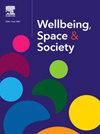Exploring the relationships between worry about climate change, belief about personal responsibility, and mental wellbeing among adolescents and young adults
Abstract
Today's adolescents and young adults experience high levels of media coverage, public opinion, and formal education about climate change. The young people of today are also projected to experience more climate change related extreme events than previous generations. Although adolescents and young adults may worry about the impacts of climate change and feel personal responsibility to reduce climate change, there is little known about how this relates to their mental wellbeing. This study used data from the 2016/17 European Social Survey Round 8 to examine relationships between climate change worry and beliefs about personal responsibility to reduce climate change with mental wellbeing (happiness and life satisfaction) among adolescents and young adults. Worry about climate change was negatively associated with both happiness and life satisfaction. Belief of a personal responsibility to reduce climate change was positively associated with both happiness and life satisfaction. Frequency of thoughts about climate change moderated the relationships between belief about personal responsibility and happiness. Belief in a personal responsibility to reduce climate change moderated the relationship between worry about climate change and both mental wellbeing outcomes. These findings suggest that young people who feel personally responsible for climate change reduction report on average better wellbeing, which means that holding such beliefs could be a promotive factor for positive mental health among adolescents and young adults.

 求助内容:
求助内容: 应助结果提醒方式:
应助结果提醒方式:


